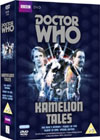DVD Extras include:
Long vs. ShortThe opening of the story works quite well, taking enough time to introduce all the characters properly, beginning with the locals in a good long scene in the castle's banquet hall, and setting up their motivations for the story in general and for the following jousting sequence in particular. The jousting sequence then features some superb location work that goes far to help sell the period. The TARDIS demonstrates both a perfect materialization and the relationship between its interior and exterior as our three series leads are suitably introduced as strangers to this time. Later, when Sir Geoffrey makes his entrance, he and Sir Gilles immediately declare themselves to each other and thus to the audience, introducing one identity and reinforcing another. All very well done.It is the shorter scenes that feel out-of-place, and aren't given enough time for the audience to understand what the writer is trying to get out of them. Turlough is an early casualty, as his character feels like it was tacked on to the script at the last minute. Dialogue is also not great in this one. The writer revels in obscure references, cleverness, and unfinished sentences, resulting in many half-expressed or poorly expressed ideas. In a long scene, one can at least follow the gist of the story. In a short scene, entire story points are lost.
Manipulative PretzelsDissecting this story raises a lot of interesting questions of character motivation and plot, but to avoid any spoilers here, I'll save the details of that discussion for the in-depth analysis version of this review, and just provide a bit of an overview. Early on, the Doctor identifies a few good people he would like to help during this adventure, providing him with his main purpose, and he gets off to a very decent start for most of episode one. In a key scene later on, it's only natural that the Doctor should intervene once again. As he does though, he falls victim to the ailment former script editor David Whitaker used to often impose on him. He leaves truth behind and starts making things up instead, for seemingly no good reason other than to talk down to the locals and try to manipulate the situation. Ugghh!! And in this writer's hands, the Doctor's reasoning remains unexpressed in his own head.At least he's entertaining us with a bit of swordplay. The choreography is not bad for running TV studio footage, although shooting & editing on film probably would have taken things up another notch. Episode One's cliffhanger is not as polished or impactful as similar story points in other adventures. Another bizarre unanswered question surrounds what the locals must be making of all this. Part Two proceeds to be far less easy to follow and understand, raising a whole host of other character logic questions. Perhaps there are good answers here in this pretzel of hidden identities and purposes, but the audience has too little time to find such subtleties in all the short scenes that flip by so quickly. Uncovering the truth IN FRONT OF the good locals should have remained the priority. A great smattering of shorter scenes take over the episode for some time, providing a lot of the running-about action and energy that one comes to expect from Doctor Who stories. Character motivations are not, however, very clear or convincing during this section. The story eventually rises to excellence and once more earns its place as a tale of science fiction during a long confrontation scene. Whatever difficulties the overcomplicated props may have caused during taping, the end result is suitably weird and effective. Terence Dudley's brilliant stroke in suggesting certain abilities made things both interesting and manageable for studio taping. Nice one. And of course the production complexities are easily lost on an audience caught up in the story. The scene also offers a nod to the importance of mental power seen all throughout season twenty. Nice! This is another good notch in this story's belt.
"Don't think you've won yet, Doctor!"So far this has been a pretty decent second episode for any good four-part adventure - only "The King's Demons" isn't a four-parter. As a concluding episode, it has left far too much dirty laundry flapping in the wind. One major key is the statement the Doctor made about his goals several scenes earlier. This statement has built up anticipation for where the story should go in the next episode, and "The King's Demons" feels very unfinished for not delivering, and not giving any other convincing reasons for deciding to stop where it does.And with all that unfinished business hanging over the characters' heads, it all feels out-of-place, off-tone, and slightly callous. Not a great ending at all.
Tegan's role in this adventure is worth noting, because she gets the chance to play all the traditional functions of the companion for once, which is actually rarer for her than you'd think. Interesting. Acting is of a generally high calibre by all participants, resulting in an enjoyable viewing experience. However, actor Gerald Flood stands out in my mind, as he seems to be having an absolute blast playing bad King John. As much as I think it was an awful move for the Doctor to suggest boiling in oil, I wouldn't want to miss Flood's delighted response to it for all the tea in China. Music plays an important role in this story. Delays caused by strikes led to many jobs on this production being started by one person and completed by another, and music was certainly affected here. Peter Howell composed several lute pieces that were needed prior to taping, including the King's War Fund Song highlighted throughout the story - a nice iconic piece. My tastes are predictable of course; I prefer it without the lyrics.
This story is available on DVD and VHS video:
Comments on this article are welcome. You may contact the author from this page:
|
||||||||||||||||||||||||||||||||||||||











